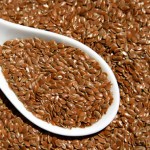Flaxseed, a Cure for Many Forms of Cancer
Flax seeds have great therapeutic properties, proven not only by traditional use, but also by numerous scientific studies. Over 20 major health disorders can be treated with flax seeds, the most important of those being, as you will no doubt agree, cancer. Flax seeds have been proven to be effective in both preventing and curing various forms of cancer, most notably breast cancer, prostate cancer and lung cancer.

Contents
Anticancer properties (scientific studies)
A study published in Integrative Cancer Therapies in 2013 concluded that “flax may be associated with decreased risk of breast cancer. Flax demonstrates antiproliferative effects in breast tissue of women at risk of breast cancer and may protect against primary breast cancer. Mortality risk may also be reduced among those living with breast cancer.” A study published in Breast Cancer Research and Treatment in 2014 showed that treatment of certain breast cells/tumors with stearidonic acid enriched flaxseed oil resulted in more apoptotic cells (in tumors) both in vivo and in vitro and a higher expression of certain apoptotic molecules.
A study on men with localized prostate cancer, published in Journal of Medicinal Food in 2013, showed that “flaxseed-derived enterolignans may hinder cancer cell proliferation.”
A study published in Journal of the American Medical Association in 2005 demonstrated that “high intake of the lignans enterolactone and enterodiol and use of hormone therapy were associated with a 50% reduction in risk of lung cancer.”
A study published in BMC Genomics in 2013 concluded that “nutritional intervention with flaxseed targets the pathways regulating branching morphogenesis and thereby alters the progression of ovarian cancer.”
A study published in Familial Cancer in 2014 showed that “treatment with alpha-linolenic acid inhibits cell proliferation, adhesion and invasion in both human and mouse colon cancer cell lines.”
Nutritional value
Flax seeds are an excellent source of dietary fiber (27.3 g/100 g – 109%DV), vitamins (especially thiamin: 1.6 mg/100 g – 110%DV, and vitamin B6: 0.5 mg/100g – 24%DV), minerals (especially manganese: 2.5 mg/100 g – 124%DV, magnesium: 392 mg/100 g – 98%DV, phosphorus: 642 mg/100 g – 64%DV, and copper: 1.2 mg/100 g – 61%DV, but also selenium: 25.4 mcg/100 g – 36%DV, iron: 5.7 mg/100 g – 32%DV, and zinc: 4.3 mg/100 g – 29%DV) and omega-3 fatty acids (22.8 g/100 g). The main omega-3 fatty acid contained in flax seeds is alpha-linolenic acid, which has valuable properties by itself, but its true indisputable value is that it is the essential fatty acid which the body converts into the more potent eicosapentaenoic acid (EPA) and docosahexaenoic acid (DHA), the omega-3 fatty acids found in fish oil.
Other uses
- Diabetes
- High cholesterol levels
- Autoimmune disorders (especially systemic lupus erythematosus and Sjogren’s syndrome)
- Osteoporosis
- Attention deficit hyperactivity disorder
- Heart disease
- High blood pressure
- Stomach upset
- Constipation
- Irritable bowel syndrome
- Diverticulitis
- Bladder inflammation
- Breast pain
- Menopausal symptoms
- Benign prostatic hyperplasia
- Metabolic syndrome
- Weight loss
- Skin irritation
Dosage
The usual dose is 30-50 g a day.
Precautions
Flaxseed in contraindicated during pregnancy and breast-feeding. Although there isn’t yet any clinical evidence that flaxseed is harmful in these cases, it is believed that the relatively high content of estrogen-like phytohormones may interfere with the normal course of pregnancy, so it’s better to stay on the safe side and not consume flaxseed if you are pregnant or breast-feeding.
Flaxseed is to be consumed with precautions by those suffering from bleeding disorders (it may slow clotting), diabetes (it augments the hypoglycemiant effect of other medicines and can thus lower the blood sugar levels too much), gastrointenstinal obstructions and inflammations, high triglyceride levels, low blood pressure or high blood pressure (it augments the hypotensive effect of other medicines and can thus cause blood pressure to become too low).



